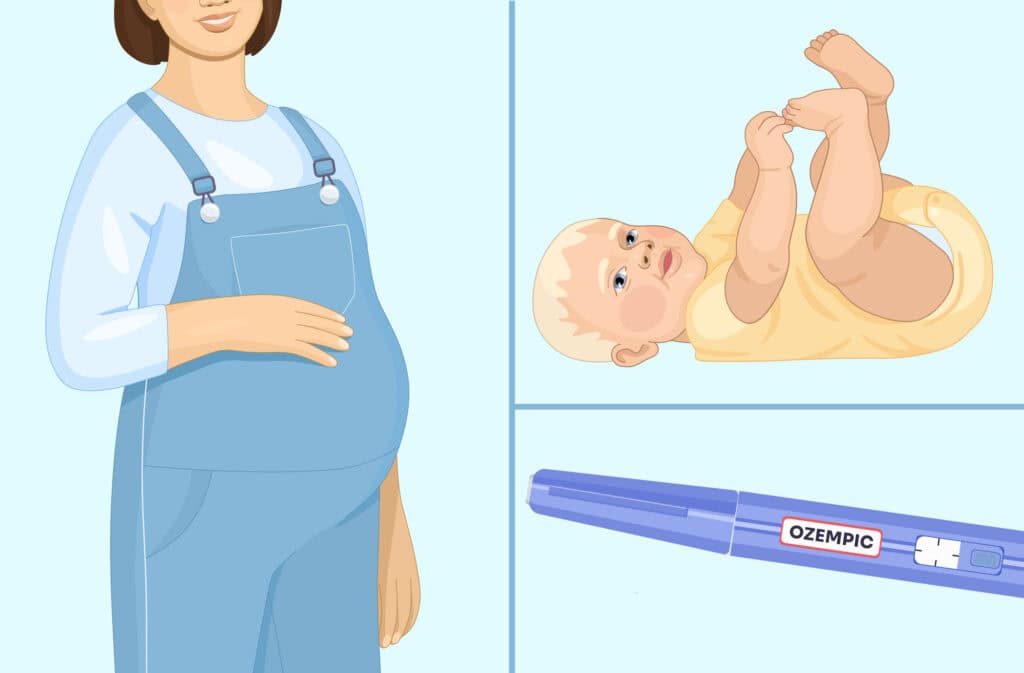Femia > Health Library > Getting Pregnant > Planning pregnancy > Ozempic babies: What you need to know about Ozempic and pregnancy
Ozempic babies: What you need to know about Ozempic and pregnancy

- Updated Feb 10, 2025
- Published
CRAFTED BY HUMAN
Crafted by human At Femia, we provide accurate and up-to-date information at every stage of your journey, from trying to conceive, pregnancy and postnatal support. All content is created by a real person based on in-depth research and own professional experience. Femia ensures that you will receive expert advice, strict accuracy and a personalized approach from our authors/medical experts. Learn more about our editorial policy.
FACT CHECKED
Fact checked At Femia Health, we maintain the highest standards of editorial excellence in delivering content focused on helping you conceive, guiding you through pregnancy, and supporting you postpartum. Explore our content review principles to learn how we ensure the accuracy and quality of our health and lifestyle tips for every stage of your journey.
- Ozempic (semaglutide) can improve fertility by managing diabetes, obesity, and PCOS, leading to weight loss and better metabolic health.
- While it may increase chances of conception, Ozempic is not approved for fertility treatment and should be stopped 2 months before trying to conceive.
- It’s not recommended for use while pregnant or breastfeeding.
Weight loss, the return of regular menstrual periods, and improvements in blood pressure, sugar, and cholesterol are only some of the positive effects women have recorded after going on Ozempic. In a recent trend, women are taking to social media to share stories of their “Ozempic babies,” pregnancies made possible because of the positive health effects of semaglutide. Improved fertility is a relatively new observed effect of taking the medication. This also means there are limited clinical studies on the effects of taking Ozempic while pregnant. Since most of the effects of Ozempic reported have been positive so far, this article will explore the implications of its use for fertility and during pregnancy.
Femia offers personalized insights on health, medication, and conception
What is Ozempic?
While Ozempic has been seen in mainstream media as the weight loss miracle, its primarily prescribed role is for managing type 2 diabetes. Consisting of semaglutide, this medication mimics a gut hormone, glucagon-like-peptide-1 (GLP-1), which helps regulate insulin and curb appetite. Both these effects are beneficial for managing type 2 diabetes and obesity.
Ozempic has not been approved for use in weight loss but is often prescribed “off-label” to manage obesity. A counterpart drug, Wegovy, contains semaglutide and has recently been FDA-approved for weight loss management. Wegovy contains a higher dose of semaglutide than Ozempic. This makes it more effective, with an almost 15% recorded weight loss among the patients in one randomized controlled trial.
If you are on regular doses of semaglutide, over time, you may notice weight loss, increased control of your appetite, and better regulation of your blood sugar. A direct effect of this, especially for women where excess weight has affected their menstrual cycles, is the restarting of regular periods and ovulation. This is a welcomed effect of the drug, especially for women who have struggled for years to conceive.
👉Find out more: Fertility diet: What to eat to boost your chances of getting pregnant
What is Ozempic’s effect on birth control?
If you are on birth control pills and got pregnant while taking Ozempic, the GLP-1 agonist may have affected the absorption of your contraceptive pills.
One of the ways in which Ozempic reduces your appetite is by slowing down the emptying of your stomach, keeping you feeling full for longer. This sluggish emptying of your gut can also hamper the absorption of any pills you are taking orally, making them ineffective. This side effect can affect contraceptive methods like birth control pills.
For women with irregular periods or known fertility concerns, oral contraception might be skipped or overlooked as a necessary step to prevent getting pregnant. This can make pregnancy come as quite a surprise for those who didn’t think it was possible.
Since weight loss from the use of Ozempic can increase your likelihood of conceiving, if you do not wish to get pregnant, it is advisable that you consult your doctor for personalized contraceptive options while on this medication.
Can you get pregnant on Ozempic?
With the enlightening stories of Ozempic babies, it is a good guess that you might get pregnant while taking Ozempic. However, this is not true for everyone on semaglutide.
As mentioned earlier, Ozempic’s primary use is for managing type 2 diabetes, specifically for regulating insulin levels. Women who are obese or have health conditions such as PCOS may also experience insulin fluctuations which may benefit from Ozempic.
Diabetes, PCOS, and even obesity can affect your chances of getting pregnant. Dysfunction in your metabolism because of these health conditions can disregulate your menstrual cycle. With Ozempic offering better insulin control and subsequent weight loss, your metabolic health improves, favoring regular ovulation. This can result in Ozempic pregnancy, sometimes even before you have a normal period.
👉Find out more: Best fertility exercises: Yoga, workouts, and more to boost fertility
How does semaglutide affect fertility?
Diabetes is known to affect your fertility in several ways. Some ways include ovarian dysfunction, inflammation, and immunological function. Both PCOS and obesity are also known to reduce fertility through similarly complex mechanisms.
Semaglutide’s primary effect in your body is to regulate how insulin is used and moderate your blood sugar levels. This proves beneficial for all conditions that include insulin resistance, such as diabetes, obesity, and PCOS. Weight loss, even as little as 5%, along with improved insulin utilization and sugar levels, kickstart regular ovulation, which was previously absent or irregular. Ozempic also lowers inflammation in your body, creating more hospitable conditions for pregnancy.
In short, while not a direct effect, semaglutide can improve your fertility and increase your chances of getting pregnant.
Can you take Ozempic while trying to get pregnant?
Women talking about their Ozempic babies is a relatively new revelation, which means its association with conception rates is not fully known. Ozempic can help improve your chances of getting pregnant by treating conditions such as diabetes, obesity, or PCOS. All these conditions are known to negatively affect fertility.
Some doctors may also prescribe you Ozempic if you are diabetic, since semaglutide can positively affect your chances of getting pregnant even if other medications or lifestyle changes have not helped you in the past. So you may be taking Ozempic as a part of your fertility journey to treat other underlying conditions.
However, it is not advisable to take semaglutide unless a doctor has prescribed it for you. Ozempic is not recommended for the sole purpose of improving fertility.
As you reach your weight loss goals and begin considering starting a family, it’s important to discuss your medication plan with your healthcare provider. The National Institutes of Health (NIH) recommends stopping Ozempic or any semaglutide 2 months before trying to get pregnant.
What happens if you get pregnant while taking Ozempic?
While Ozempic does appear to improve fertility, continuing to use such medications while pregnant poses serious and negative effects. Most of the studies done so far on semaglutide use have not included women who have been trying to get pregnant or are pregnant. There is a study underway to examine the effects of Wegovy during pregnancy, however, it will be a few years before we see substantial results.
If you are taking Ozempic and do become pregnant, consider consulting your healthcare provider immediately. It can be overwhelming, especially if becoming pregnant is what you least expected to happen right now. Your doctor will guide you toward medications that are safe to use during pregnancy to manage diabetes and provide general support for maintaining a healthy pregnancy.
Can you take Ozempic while pregnant?
The National Institutes of Health (NIH) recommends stopping Ozempic or any semaglutide 2 months before trying to get pregnant.
This is because Ozempic is a relatively new drug, and most clinical trials are not focusing on pregnant women to study the efficacy of Ozempic.
A 2023 observational study of 50,000 pregnant women with type 2 diabetes taking non-insulin antidiabetic medications at the start of their pregnancies showed no relevant increase in congenital malformations as a result of these medications. However, studies on GLP-1 agonists in pregnant animals showcased pregnancy risks, low birth weight, and skeletal deformities. These results suggest there may be significant risks in taking semaglutide while pregnant.
Since most of the data available on the effects of Ozempic are not definitive, it is best to stop taking this medication, with your doctor’s say so, if you are trying to get pregnant. If yours is an Ozempic pregnancy, talk to your doctor about alternative medications that are safe to use throughout your pregnancy.
Alternatives to Ozempic during pregnancy
Being overweight or having diabetes can pose a risk to your pregnancy. While Ozempic may have seemed life-saving in managing either of these conditions before you became pregnant, you may have to opt for alternatives while you are pregnant.
This can seem overwhelming, especially if your pregnancy was unexpected, but enlisting the help of your doctor and other experts can help lighten the load, preparing you for your pregnancy ahead.
As a trade-off for Ozempic, you may have to switch to insulin, which is safer to use for diabetes during pregnancy. Additionally, your lifestyle will require significant fine-tuning in terms of diet and exercise during pregnancy, since these are the safest methods to manage fluctuations in metabolism and influence your blood sugar, fats, and blood pressure during pregnancy.
Femia offers personalized insights on health, medication, and conception
Questions from the Femia community
Can Ozempic cause birth defects?
There isn’t enough clinical data to confirm whether or not Ozempic can cause birth defects. The few studies available from animal studies show the possibility of low birth weight and pregnancy complications related to GLP-1 agonist use during pregnancy. If you are trying to get pregnant or find out you are pregnant while using Ozempic, consult with your healthcare provider.
Is it safe for my baby if I use Ozempic while breastfeeding?
Currently, it is not known whether Ozempic is safe to take while breastfeeding. Therefore, it is advisable to avoid Ozempic if you are breastfeeding. For more individualized advice on Ozempic use, consult with your healthcare provider.
How long should I wait after stopping Ozempic before trying to conceive?
If you are trying to get pregnant, it is advisable to stop Ozempic for a couple of months before you conceive. Since the medication can still be present in your system, it is best to ask your doctor about the appropriate time to wait, along with alternative medication you can use if you become pregnant.
The bottom line
Known as the weight-loss miracle drug, Ozempic has seen a wave of positive stories about Ozempic babies due to increased conception rates among women taking this GLP-1 medication. Improved metabolism and weight loss create more favorable fertility conditions, and unexpected pregnancy has become a sensational chance effect resulting from Ozempic. Semaglutide is not indicated for use in treating infertility.
Currently, there is limited conclusive data on the effects of Ozempic on pregnancies, which makes it important to stop the medication if you are trying to get pregnant. Discuss alternatives with your healthcare provider that will be safe for you and your baby during pregnancy.
References
- Office of the Commissioner. “FDA Approves New Drug Treatment for Chronic Weight Management, First Since 2014.” U.S. Food And Drug Administration, 4 June 2021, www.fda.gov/news-events/press-announcements/fda-approves-new-drug-treatment-chronic-weight-management-first-2014.
- Organization of Teratology Information Specialists (OTIS). “Semaglutide.” Mother to Baby | Fact Sheets – NCBI Bookshelf, 1 Mar. 2023, www.ncbi.nlm.nih.gov/books/NBK600385/#:~:text=People%20eliminate%20medication%20at%20different,2%20months%20before%20a%20pregnancy.
- Garvey, W. Timothy, et al. “Two-year Effects of Semaglutide in Adults With Overweight or Obesity: The STEP 5 Trial.” Nature Medicine, vol. 28, no. 10, Oct. 2022, pp. 2083–91. https://doi.org/10.1038/s41591-022-02026-4.
- Kapitza, Christoph, et al. “Semaglutide, a Once‐weekly Human GLP‐1 Analog, Does Not Reduce the Bioavailability of the Combined Oral Contraceptive, Ethinylestradiol/Levonorgestrel.” The Journal of Clinical Pharmacology, vol. 55, no. 5, Jan. 2015, pp. 497–504. https://doi.org/10.1002/jcph.443.
- Anna, Garnytska, et al. “Causes of Infertility in Women With Diabetes: Literature Review.” International Journal of Clinical Case Reports and Reviews, vol. 14, no. 04, Sept. 2023, pp. 01–07. https://doi.org/10.31579/2690-4861/334.
- Bond, Rachel Talia, et al. “Obesity and Infertility: A Metabolic Assessment Strategy to Improve Pregnancy Rate.” PubMed Central (PMC), 1 Mar. 2020, www.ncbi.nlm.nih.gov/pmc/articles/PMC7048694.
- Pavli, Polina, et al. “Infertility Improvement After Medical Weight Loss in Women and Men: A Review of the Literature.” International Journal of Molecular Sciences, vol. 25, no. 3, Feb. 2024, p. 1909. https://doi.org/10.3390/ijms25031909.
- Study Details | A Study to Evaluate the Safety of Exposure to Wegovy During Pregnancy | ClinicalTrials.gov. clinicaltrials.gov/study/NCT05503927.
- Cesta, Carolyn E., et al. “Safety of GLP-1 Receptor Agonists and Other Second-Line Antidiabetics in Early Pregnancy.” JAMA Internal Medicine, vol. 184, no. 2, Feb. 2024, p. 144. https://doi.org/10.1001/jamainternmed.2023.6663.
- Muller, Dion R. P., et al. “Effects of GLP-1 Agonists and SGLT2 Inhibitors During Pregnancy and Lactation on Offspring Outcomes: A Systematic Review of the Evidence.” Frontiers in Endocrinology, vol. 14, Oct. 2023, https://doi.org/10.3389/fendo.2023.1215356.
- Blum, Alyson K. “Insulin Use in Pregnancy: An Update.” Diabetes Spectrum, vol. 29, no. 2, May 2016, pp. 92–97. https://doi.org/10.2337/diaspect.29.2.92.

Learn how to distinguish implantation bleeding from your period. Discover key differences in timing, flow, and symptoms. Expert advice from Femia on early pregnancy signs.

Learn about the signs of pregnancy after Depo-Provera, how long it takes to get pregnant, and tips for conceiving after stopping the birth control shot.

What is newborn milk tongue and how to tell the difference between milk tongue vs thrush? Learn all about baby milk tongue and how to get rid of white tongue on baby.

